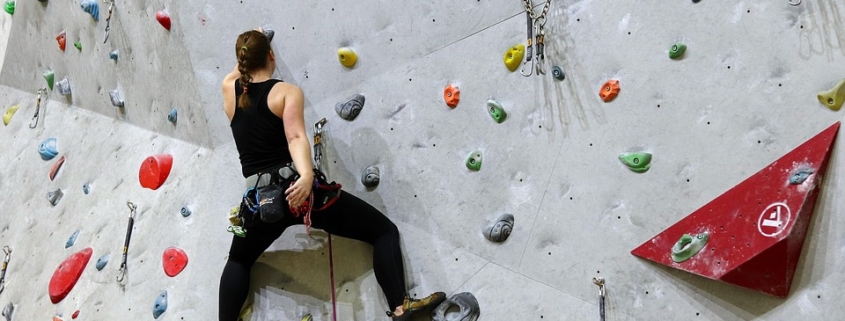Rock Climbing and Eating Disorders: Navigating a Complex Relationship
Author: Kathryn Lodwick-Jones
Rock climbing is a sport celebrated for its mental focus, physical challenge, and the deep sense of community it often fosters. But behind the adrenaline and achievement, there’s a growing awareness of a quieter struggle: the prevalence of disordered eating and body image concerns within the climbing community. While climbing can promote health and resilience, certain aspects of the culture, particularly in competitive or elite settings can also increase vulnerability to eating disorders.
Why Rock Climbers May Be at Risk
Several factors make climbers, especially those in disciplines like bouldering or sport climbing, more susceptible to eating disorders:
- Emphasis on Power-to-Weight Ratio: In climbing, a leaner body is often associated with improved performance. While it’s true that body weight can affect one’s ability to pull hard or maintain grip, over-fixation on weight can lead to maladaptive behaviors like food restriction or excessive training.
- Aesthetic and Performance Pressures: The impact of exposure to social media, pressure to get sponsorships, and the constant drive to compete and improve can intensify body scrutiny, especially for younger athletes or those striving for professional recognition.
- Perfectionism and Control: Many climbers are naturally goal-oriented and disciplined, traits that can become risk factors when combined with disordered eating patterns.
- Lack of Education and Normalization of Harmful Behaviors: In competitive sports culture, an emphasis on powering through and “doing what it takes” to get better also enforce potential early warning signs. Conversations about restrictive eating or “cutting weight” are often normalized in training environments, sometimes without understanding the psychological or physical consequences.
Signs of Disordered Eating in Climbers
Eating disorders come in many forms, including anorexia nervosa, bulimia nervosa, binge eating disorder, and other specified feeding or eating disorders (OSFED). It’s important to note that disordered eating can affect anyone, regardless of gender, body type, or climbing grade. Some warning signs in climbers may include:
Obsessive tracking of calories, weight, or food intake
Avoiding meals, especially in social or post-climbing settings
Anxiety or guilt around food choices
Persistent fatigue, injuries that don’t heal, or loss of menstruation in AFAB (assigned female at birth) individuals
Declining performance despite increased training
Building a Culture of Health in the Climbing Community
The climbing community can play a powerful role in shifting the narrative away from weight obsession and toward sustainable performance and well-being. Here are some ways climbers, coaches, and gyms can help:
- Promote Body Diversity and Success in all Shapes and Sizes: Encourage climbers of all shapes, sizes, and abilities. Avoid comments about bodies, even if they seem positive. A compliment about someone being “lean” or “strong-looking” can unintentionally reinforce harmful ideals. Focus on climber’s skills and areas they’ve overcome challenges due to work ethic, not sacrifice.
- Prioritize Nutrition Education: Meeting dietary needs consistently and properly is crucial for recovery, strength, and mental clarity. Athletes should understand that food is not the enemy, it’s performance fuel and a natural comfort for all humans. Dietitians who understand both sports nutrition and eating disorders can offer vital support. In order to send a route, you have to have the energy to get there.
- Watch Language Around Food and Weight: Jokes or offhand remarks about needing to “cut” for a project or not “deserving” a post-climb meal can normalize disordered thinking. Coaches and teammates should model respectful, body-neutral talk and discourage a culture of “earning food”.
- Encourage Rest and Recovery: Overtraining and restricting food intake can lead to serious conditions like RED-S (Relative Energy Deficiency in Sport). Celebrating rest days and recovery as part of training can shift the culture toward balance.
- Know When to Refer: If a climber is showing signs of distress, referring them to a licensed therapist, psychologist, or dietitian experienced in eating disorders is essential. Early intervention can save lives and restore not just health, but joy in climbing.
Recovery Is Possible and Worth It
For climbers in recovery, it can feel scary to return to the sport, especially if triggers still exist in gym culture or peer groups. But with the right support, it’s absolutely possible to reclaim a healthy relationship with both food and movement. Climbers in recovery often describe a deeper appreciation for their bodies, not just for how they look or perform, but for what they allow them to do: connect with nature, experience focus, play, and move with intention.
Rock climbing offers incredible opportunities for growth, connection, and resilience, but it’s vital that the community remains vigilant and compassionate about the hidden challenges that can come with performance pressure. By fostering open conversations about eating disorders, promoting body neutrality, and prioritizing mental health alongside physical strength, climbers can help reshape the sport into one where everyone thrives, on and off the wall.
Equilibria is a group of licensed mental health professionals in Pennsylvania and New Jersey with multiple specialties to serve all aspects of our diverse community’s mental, emotional, and behavioral needs. We provide in person and telehealth services to individuals of all ages, families, and those in relationships. Click here to schedule an appointment today.


